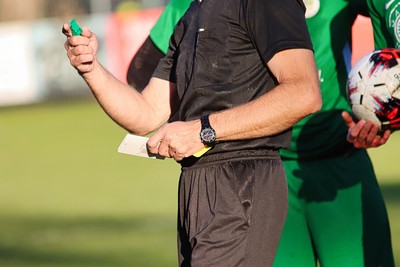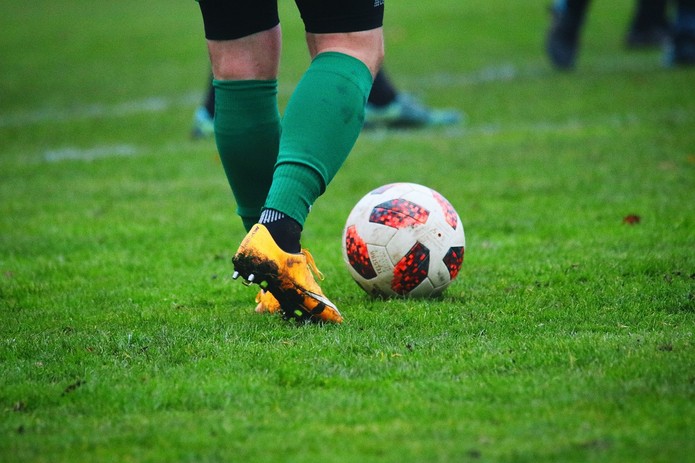 There’s a feeling that ill-discipline in football is getting out of control.
There’s a feeling that ill-discipline in football is getting out of control.
How often do we see swarms of players from both teams surrounding the referee when a flashpoint occurs on the pitch? They could caution a handful of them for dissent, but often choose not to – perhaps for fear of a media hammering if they start wielding the yellow card with such abandon.
One of the other problems is that grassroots players tend to ape what they see on TV – leading to a whole host of violent incidents in local leagues that are seeing referees leave the sport in their droves.
So what’s the solution? IFAB, the organisation that develops and oversees football’s rulebook, believe that it could the introduction of the sin bin – the punishment used in rugby union to sanction those committing offences not severe enough for a red card, but which can be filed under ‘game changing’ infringements or repeated bad behaviour.
Could the sin bin work in football?
On Trial
 Although the sin bin won’t be rolled out in professional football quite yet, IFAB have confirmed their interest in trialling the system at a high grade of the beautiful game – that could see one of the top four tiers of English football used as a guinea pig.
Although the sin bin won’t be rolled out in professional football quite yet, IFAB have confirmed their interest in trialling the system at a high grade of the beautiful game – that could see one of the top four tiers of English football used as a guinea pig.
The initiative will be voted on by IFAB members in 2024, with the possibility that the sin bin could be trialled during the 2024/25 season.
The issue is that IFAB cannot force a particular competition or league to participate in the trial, so that approval would need to come from within – would the Premier League, for example, want to be a test subject for a potential rule change that may never see the light of day?
In these early days of sin bin discussions, it’s not known exactly how or when a referee will have the power to send a player to the bin over simply giving them a yellow card as normal, nor for which offences. But it’s likely that persistent dissent will be one of the areas targeted by the sin bin, as well as ‘tactical’ fouls for which a yellow card is considered too lenient but a red too harsh.
As you would expect from a sport that is littered with ‘radical’ thinkers and curmudgeonly traditionalists, the reception to the possibility of sin bins being introduced in football has drawn a mixed response. Arsenal legend turned Sky Sports motormouth Paul Merson claims they would ‘kill the game’, with former Chelsea defender John Terry feeling similarly.
But Jamie Carragher believes sin bins could have a positive effect on the beautiful game, writing:
“I’ve never been a fan of sin bins before, but we are watching too many games that have [red] cards and for me it ruins the game.”
Have Sin Bins Been a Success in Grassroots Football?

It was considered rather radical when sin bins were first piloted in a small handful of amateur leagues during the 2018/19 season.
Dissent at all levels of the sport, but particularly at the grassroots level, had reached endemic proportions in the campaign prior, with 25% of all yellow cards dished out for back chat and foul/abusive language.
As part of the trial, referees were given simple instructions: players who showed dissent that was considered above and beyond the realm of acceptability were to be a) shown a yellow card, and b) sent to the sin bin for ten minutes.
Of course, there is no physical sin bin to sit in – the players would simply stand on the touchline until their punishment had elapsed.
That pilot scheme was considered to be successful enough that sin bins were introduced with a wider scope during 2019/20, with levels up to step five of the National League proposed as candidates.
The authorities have since collated their findings, and the results are unequivocal: dissent was reduced by some 38% across the leagues part of the sin bin trial, while the number of red cards shown where dissent was responsible for the second booking also dramatically decreased.
Perhaps most surprisingly, a survey of some 1,400 players and coaches that had competed in a sin bin league found that 72% of players and 77% of managers would be happy to have sin bins introduced on a full-time basis.
Anecdotal evidence suggests that the sin bin has made games more enjoyable for all participants, with players even scolding their teammates who are showing dissent in a bid to stop them getting the ten-minute treatment.
Mark Bullingham, the chief exec of the FA, said of the trial:
“When we were looking at sin bins – protocol clearly has to be developed – the areas we were looking at were dissent, where it’s worked very, very well in the grassroots game in England.”
There will be resistance to such a radical move, of course, but the stats speak for themselves: the sin bin could greatly improve the standards of behaviour in professional football, which has to be considered a good thing.